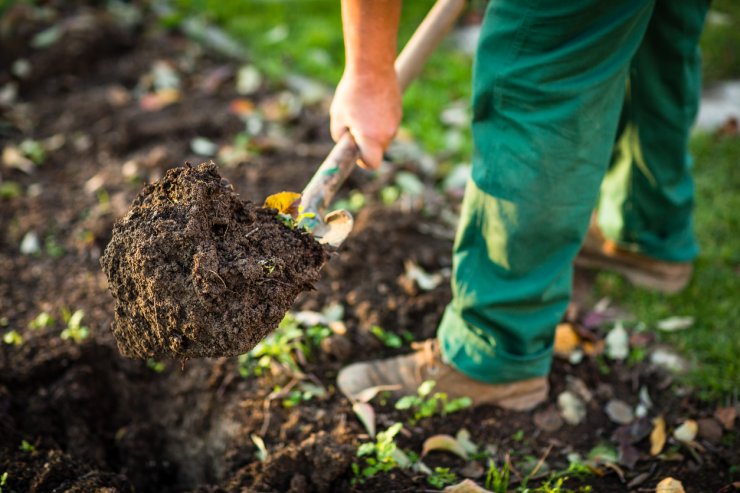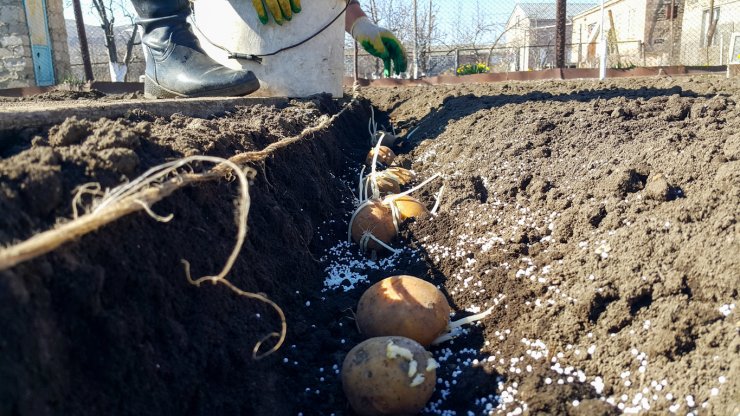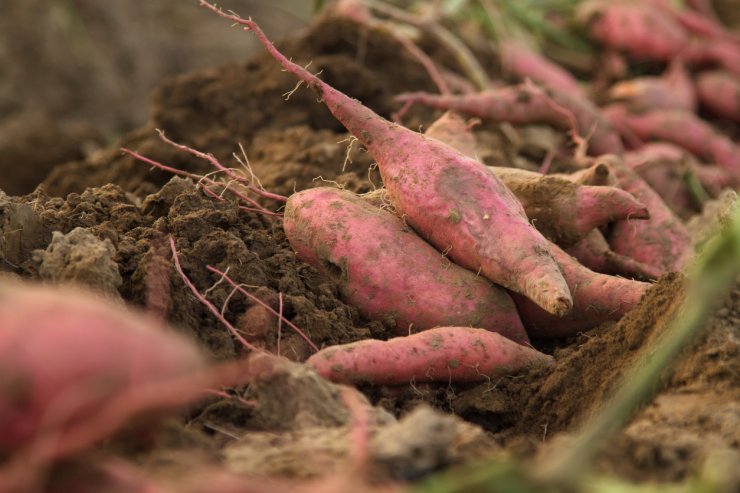
Digging in garden soil.
White Potatoes

Seed potatoes being fertilized.
White potatoes require full sun, at least 6 hours, but preferably up to 10 hours.
As for the dirt, always test your soil before you plant. Potatoes prefer well-drained soil with a pH between 5.0 and 6.0 that is free of low spots where water can collect. Sandy loam soil is best.
Potatoes benefit from periodic fertilizing: at the time of planting, one week after your plants emerge, and four to six weeks after your plants emerge.
Here’s the potato plan:
- Before planting: Use 1 pound of fertilizer for every 10 row feet. Mix the fertilizer into the top foot of the soil.
- One week after emergence: Use 1/2 pound of fertilizer per 10 row feet. Lay down the fertilizer in a band about 2 inches away from the plant (this is called side dressing). Water when you’re done fertilizing.
- Four to six weeks after emergence: Use 1/2 pound of fertilizer for every 10 row feet. Lay down the fertilizer in a band about 2 inches away from the plant. Water when you’re done fertilizing.
Use a fertilizer with balanced amounts of nitrogen, phosphorous, and potassium (N:P:K), such as 10-10-10. Don’t overdo it on the fertilizer; you may wind up with plants with lots of leaves and tubers that don’t keep well.
A word about manure: don’t use it. It tends to encourage scab development on the potatoes. Save the manure for other crops. If you have finished compost that’s free of seeds, you can use that.
Some plants are better garden partners than others. Potatoes will grow well with these plants nearby:
- bush beans
- celery
- corn
- garlic
- marigolds
- onions
- peas
Potatoes do not grow well with:
- asparagus
- Brassicas (broccoli, cabbage)
- carrots
- cucumber
- kohlrabi
- melons
- parsnips
- rutabaga
- squash
- sunflower
- tomatoes
- turnips
With a little planning, you can plant a garden where all the plants play well together.
Sweet Potatoes

Harvested sweet potatoes in soil.
Sweet potatoes require full sun as well, at least 6 hours, but preferably up to 10 hours
Sweet potatoes can grow in a wide range of well-drained soil, but they prefer a pH on the acidic side, between 5.6 to 6.5. As with all garden preparation, have your soil tested and adjust it accordingly before planting.
In general, sweet potatoes growing in good soil don’t usually need fertilizer. If they need a bit of a boost, plan to side dress your rows with nitrogen fertilizer (21-0-0) for every 100 square feet in early July. This will support the growth of the vines and encourage root growth.
Compost is a good additive to your soil, but don’t overdo it. If you’re using compost as a fertilizer, you only need about an inch per hundred square feet of garden area. Work your fertilizer or compost into the soil to a depth of about 6 inches.
What are your best tips for creating optimal soil for your potatoes? Do you fertilize your potato or sweet potato plants? What type of fertilizer do you use? How often do you fertilize? Please share your techniques with us.


 Previous
Previous

